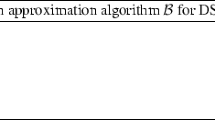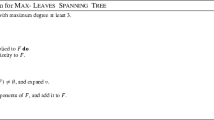Abstract
Given an acyclic directed network, a subsetS of nodes (terminals), and a rootr, theacyclic directed Steiner tree problem requires a minimum-cost subnetwork which contains paths fromr to each terminal. It is known that unlessNP⊆DTIME[n polylogn] no polynomial-time algorithm can guarantee better than (lnk)/4-approximation, wherek is the number of terminals. In this paper we give anO(k ε)-approximation algorithm for any ε>0. This result improves the previously knownk-approximation.
Similar content being viewed by others
References
S. Arora, C. Lund, R. Motwani, M. Sudan, and M. Szegedy. Proof verification and hardness of approximation problems. InProc. 33rd Annual IEEE Symp. on Foundations of Computer Science, pp. 14–23, 1992.
P. Berman, U. Fößmeier, M. Karpinski, M. Kaufmann, and A. Zelikovsky,Approaching the 5/4-Approximations for Rectilinear Steiner Trees. Lecture Notes in Computer Science, vol. 855. Springer-Verlag, Berlin, 1994, pp. 60–71.
M. Bern and P. Plassmann. The Steiner problems with edge lengths 1 and 2.Inform. Process. Lett. 32:171–176, 1989.
J. H. Camin and R. R. Sokal. A method of deducing branching sequences in phylogeny.Evolution 19:311–326, 1972.
D. Z. Du, Y. Zhang, and Q. Feng. On better heuristic for Euclidean Steiner minimum trees. InProc. 32nd Annual IEEE Symp. on Foundations of Computer Science, pp. 431–439, 1991.
F. K. Hwang, D. S. Richards, and P. Winter.The Steiner Tree Problem. Annals of Discrete Mathematics, vol. 53. North-Holland, Amsterdam, 1992.
R. M. Karp. Reducibility among combinatorial problems. In Miller and Thatcher (eds.),Complexity of Computer Computations, Plenum, New York, 1972, pp. 85–103.
P. Klein and R. Ravi. A nearly best-possible approximation algorithm for node-weighted Steiner trees. InProc. Third Confer. on Integer Programming and Combinatorial Optimization, pp. 323–331, 1993.
C. Lund and M. Yannakakis. On the hardness of approximating minimization problems. InProc. 25th Annual ACM Symp. on Theory of Computing, pp. 286–293, 1993.
K. Mehlhorn. A faster approximation algorithm for the Steiner problem in graphs.Inform. Process. Lett. 27:125–128, 1988.
L. Nastansky, S. M. Selkow, and N. F. Stewart. Cost minimal trees in directed acyclic graphs.Z. Oper. Res. 18:59–67, 1974.
S. K. Rao, P. Sadayappan, F. K. Hwang, and P. W. Shor. The rectilinear Steiner arborescence problem.Algorithmica 7:277–288, 1992.
V. J. Rayward-Smith, The computation of nearly minimal Steiner trees in graphs.Internat. J. Math. Ed. Sci. Tech. 14:15–23, 1983.
H. Takahashi and A. Matsuyama. An approximate solution for the Steiner problem in graphs.Math. Japon. 24:573–577, 1980.
B. M. Waxman and M. Imase. Worst case-performance of Rayward-Smith’s, Steiner tree heuristic.Inform. Process. Lett. 29:283–287, 1988.
M. Yannakakis. Recent developments on the approximability of combinatorial problems. In K. W. Nget al.(eds.),Algorithms and Computation. Lecture Notes in Computer Science, vol. 762. Springer-Verlag, Berlin, 1993, pp. 363–368.
A. Z. Zelikovsky. An 11/6-approximation algorithm for the network Steiner problem.Algorithmica 9:463–470, 1993.
A. Z. Zelikovsky. Better approximations algorithms for the network and Euclidean Steiner tree problems. Tech. Rep. CS-96-06, University of Virginia, Charlottesville, VA.
Author information
Authors and Affiliations
Additional information
Communicated by M. X. Goemans.
This research was supported in part by Volkswagen-Stiftung and Packard Foundation.
Rights and permissions
About this article
Cite this article
Zelikovsky, A. A series of approximation algorithms for the acyclic directed steiner tree problem. Algorithmica 18, 99–110 (1997). https://doi.org/10.1007/BF02523690
Received:
Revised:
Issue Date:
DOI: https://doi.org/10.1007/BF02523690




